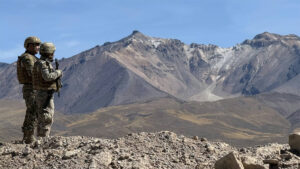The American Southwest is primed to be one of the largest beneficiaries of the changes caused by deglobalization – mainly the reshoring of manufacturing. They owe this to years of in-migration bolstering their demographics. They also account for a significant portion of the nation’s foodstuffs. However, everything in the American Southwest depends upon one thing…WATER.
To put it lightly, the water situation in the Southwest is fickle; rivers can go from rushing to bone dry in a matter of a year. Up to this point, the Colorado River Compact has been the saving grace for the Southwest: a treaty outlining how much water from the Colorado River will be allocated to each state in the region.
The issue with the compact is that it operates on a priority system. So states that were urbanized when the treaty was signed have priority over states that developed later on. Fast forward to today, and we have an archaic system that benefits places like California over places like Arizona.
So what happens if the states upstream decide to walk away from the compact and start using the water as they see fit? It would be an ugly few years of political and legal chaos, but if the Southwest wants to be the beneficiary it’s poised to be…they better figure it out quickly.
Prefer to read the transcript of the video? Click here
Here at Zeihan On Geopolitics we select a single charity to sponsor. We have two criteria:
First, we look across the world and use our skill sets to identify where the needs are most acute. Second, we look for an institution with preexisting networks for both materials gathering and aid distribution. That way we know every cent of our donation is not simply going directly to where help is needed most, but our donations serve as a force multiplier for a system already in existence. Then we give what we can.
Today, our chosen charity is a group called Medshare, which provides emergency medical services to communities in need, with a very heavy emphasis on locations facing acute crises. Medshare operates right in the thick of it. Until future notice, every cent we earn from every book we sell in every format through every retailer is going to Medshare’s Ukraine fund.
And then there’s you.
Our newsletters and videologues are not only free, they will always be free. We also will never share your contact information with anyone. All we ask is that if you find one of our releases in any way useful, that you make a donation to Medshare. Over one third of Ukraine’s pre-war population has either been forced from their homes, kidnapped and shipped to Russia, or is trying to survive in occupied lands. This is our way to help who we can. Please, join us.
CLICK HERE TO SUPPORT MEDSHARE’S UKRAINE FUND
CLICK HERE TO SUPPORT MEDSHARE’S EFFORTS GLOBALLY
TRANSCIPT
Hey everybody. Peter Zeihan here coming to you from Vegas. And today we are going to talk about water and drought and all the things that come from that. Specifically here in the American southwest, we have a water problem. Now, for those of you who know your paleontological history. That’s a mouthful. You will know that the Southwest has a history of mass extinction and civilizational breakdown events that have on time descended into cannibalism. The issue is the terrain. It’s an arid area with a lot of elevation, and that means that most of its water comes from orographic precipitation, which is a fancy term that says that when you get moisture moving across a landscape, if it hits an elevation center or a mountain, it will rise. And if the temperature at the higher elevations is cold enough, the water will condense into vapor form clouds and then rain. And most of the rainfall that hits the American southwest has that sort of origin. The problem with orographic precipitation, though, is it’s fickle. And oftentimes you will not get enough cold temperatures at elevation or not sufficiently humid air currents in order to generate the moisture in the first place. So rivers literally come and go and that is caused the collapse of civilisational systems as you get mega droughts from time to time to time. We are in one of those periods now. So that’s probably one.
Problem Two, when the American Southwest realized that they had limited amounts of water. The states back in the 1920s, 1922, I think, set up a legal structure called the Colorado River Compact, in which they agreed to share the water. The problem was that the year that they used to evaluate how much water they had to share was one of the wettest years on record. So we’ve known for decades that in time the volumes that were written out in the treaty just weren’t going to be there. In addition, this is all heavily litigated and legalized, all written down in law. And at the federal level, it’s an issue of senior water rights. So the urban centers that existed at the time of the treaty in 1922 have priority. And anyone who has built infrastructure since then to tap into the waterway network is at a lower priority. So if you were an urban center in 1922, you have senior water rights and everyone else who has added is lower and lower and lower and lower. And so if you were at the very bottom in, say, the seventies when your system was built, you’re at the very, very bottom. The first state mentioned in the compact is the one that had the highest population then and now, and that’s California. But Los Angeles has 15 million people. The entire Southwest only had that many people in 1922. So you can see as part of the problem, the last state to build out its infrastructure to tap the waterway network was Arizona. It only finished the the Central Arizona project in the late sixties and into the seventies. So they’re at the very bottom. And when there was a dispute over water a few years ago, Arizona and California ended up in court. And the Supreme Court ruled very, very clearly that California has severe water rights and Arizona is at the bottom of the stack of junior water rights, which means that Arizona water demand can go to zero before California has to cut at all. And with that ruling in California’s back pocket, California has simply refused to engage in negotiations with the other states of the Colorado River basin. So we even had a deal last year where all of the other states got together and agreed to slash their demand. If, in exchange, California were to make a moderate decline. And California refused. The California position officially is you all go to zero and die and we will just keep having our golf courses.
So the debate now among the other states, especially the upstream states, is about just walking away from the compact completely. Now, this would lead to California suing them in a court case that they would probably lose, but that would take years because it would get tied up in court. And in the meantime, California would go completely dry. And Southern California gets roughly a third of their water from the Colorado River. So massive economic dislocation. Now, aside from the whole human tragedy of this, why does this matter? Well, let me give you three reasons. Number one, the world is deglobalizing and the United States is discovering if it still wants stuff, it needs to build out its own industrial plant. So there is a competition among the states right now about where that stuff will go. Texas is probably going to be the single biggest winner of the American South. Looks really good. But there’s parts of the Southwest that are very, very high value added. And getting semiconductor fabrication facilities in places like Phoenix are a great idea. But it requires water. In addition, we need to reshore especially the electronic supply chain system. And the Southwest is probably the best part of the country for that for labor reasons. In order to do manufacturing of electronics, you need a differentiated workforce with a lot of different price points. That means the person who does the lens for the camera is not the person who does the memory board, is not the person who does the plastic molding, is not the person who does assembly. These are all different skill sets. They all have different price points for the labor. And so you need multiple skill sets, multiple price points, multiple labor forces in relatively close proximity. This is one of the reasons that East Asia has done so well in this space for decades, because you have your technocracy in Korea and Japan and Taiwan, you have your mass assembly in places like Vietnam and China, and then you have your mid-range in places like Malaysia and Thailand. The only place in North America we have that sort of variation is in the US-Mexico border. And for the Southwest that’s a really good selling point if you can keep the water flowing. And another big reason is agriculture. Now, one of the big problems, one of the reasons why the Southwest is in this problem is that they are growing a lot of food in the desert. And, you know, if you look at that on its surface, you’ve got to wonder if that was a very good idea in the first place. And the answer is no, it was not a very good idea in the first place, but it is now part of our food security system. And so places like Yuma, Arizona, which are about as far south in the country as you can get, get all of their water from these water courses that are governed by the compact and of Colorado just walks away. Then in the winter, we’re talking about losing a quarter to a third of most of her fresh vegetables because it’s got the perfect climate for it if you got the water. Now, unlike, say, interior Washington, where you’ve got the Columbia River, which is the continent’s biggest water flow by volume, and you take water from that for, say, the Yakima and the Walla Walla, the Benson systems. You know, it’s not a big deal, but you can’t do that at scale over time in a watershed like we have in the Southwest. And so we’re talking about losing a significant amount of food production that is important, not just locally and regionally, but across the national system.
Now, California don’t get too smug. The Central Valley is facing this exact same problem, and you can’t blame that one on any one upstate. That is your homegrown ecological and agricultural crisis. That’s a problem for another day. And then third, taxes. One of the things that we’ve seen in the last few years is Americans are moving in a way that they haven’t in quite some time. The baby boomers want to move someplace where it’s warmer. The millennials want to move to someplace that has more elbow room where it’s cheaper to expand the cities and therefore they can afford yards. And not a lot of people want to be dependent on mass transport because they’re afraid of diseases. Well, the American Southwest scratches all of those itches. And it has been the fastest growing part of the country from in-migration in the country now for roughly 50 years. And all else being equal, there’s not a lot of reason to expect that to change unless there’s a persistent water crisis.
Now, the good news is there are a lot of things that America can do in order to get by a lot better. You remove a lot of the water intensive agriculture from the region. You make things like golf courses go away. You don’t have fountains in Phoenix, for example, and you just manage your water resources with the best technologies of the 13th century, we can probably have a population increase of 50% without a problem.
But above all, the Colorado Compact has to be renegotiated for a more realistic environment. And since California will not choose to do that willingly, they are going to have to be forced, which means either we do have a crisis first triggered by the upstream states or Congress steps in and abrogates the pact and imposes a replacement. This is going to be an ugly, ugly political issue for the next few years. That is absolutely unavoidable, but is absolutely critical if the United States in general, this region in specific, is going to take advantage of the demographic and geopolitical shifts that are wracking our world right now. This region should be one of the biggest beneficiaries of the changes going on, but they have to be able to get the water situation right.
Alright. That’s it for me. See you guys next time.







